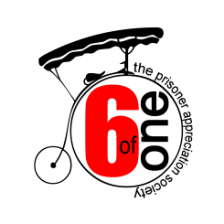BOOK THEME - VINCENT TILSLEY
Vincent Tilsley, the writer who became a psychotherapist
In 2003 Vincent was a guest at the Six of One Portmeiricon. He was as interested in the Prisoner fans and what we thought as we were with him and his views. As the interview conducted by me – alas not recorded - drew to a close, he had previously expressed a desire to host a seminar himself. So, as arranged, Vincent announced that he would be hosting our next session. As an audience member wrote, “This was a new departure which went beyond the guest talking about the history of The Prisoner and their memories.” Vincent then made the point that the cold war context in which The Prisoner was made no longer existed, and so participants should think about what themes would be included if the show was being made now. Attendees should share their ideas. It made for a thoroughly cerebrally stimulating time. Whilst the Cold War scenario was largely consigned to the past, freedom and the struggle of individualism in an increasingly bureaucratic and hostile world remain timeless.
During that weekend he met with many of the fans, including Merlina, to whom he gave a second interview. This appeared in full in Free for All issue 7. Here is a flavour.
“The thing I didn’t quite say this afternoon, when I said about the cross, about the lines that were cut. When I wrote about ‘you’re back to religion’, you were supposed to infer from that that the two sides, basically they’re conflicts of faith. They are religions; they’re the great secular religions. Capitalism and Communism – they’re religions. What I really wanted to go on to say was that so far as I was concerned, if the Prisoner’s rebellious idea had any validity, it was to pass on the idea that the reason why these people get away with it, is only because we let them. It isn’t because they’re incredibly powerful, they’re only powerful because, in the end, we are lazy, and we’re looking for safety. And that’s what keeps bringing us back to whatever the religion happens to be called. Whether it’s Consumerism or Buddhism or whatever, it’s because we’re lazy. We want to scream our heads off, ‘We want liberty!’ No, we don’t. We do not want freedom. It’s a very mature thing, to want freedom.
“So, what I had meant to say was: it isn’t getting a different system of government. Because the system of Government reflects who we are. It’s about us changing, and actually standing up for ourselves, not against other people, against ourselves – our weak, stupid, greedy, cowardly selves. Now, I didn’t mean that I thought everyone would infer all of that from one little scene, and if they hadn’t cut those lines, they’d have got the point. But that was the kind of atmosphere, that was the kind of resonance of it as I was writing it.”
Thus, “All the earth one big Village”, was a deliberate attempt by Tilsley to make a point, to issue a warning, because he was acutely aware of the growth of totalitarianism around the world, how fragile democracy is, and he sensed our society might succumb, if not politically, then through the dangers of capitalist ‘Big Business’ consumerism. By taking an alternative path, rejecting a conventional career within the ‘system’, Vincent was better able to take an objective view of the world. Discussing the work of the psychiatrist Jung with Merlina, he expressed his philosophy succinctly, “I think that Jung was tremendously aware of the inner self, which had to come forth, and that’s what we’re here for. Other people see psychology as enabling you to adjust to society by getting you to fit in. Those are two totally different points of view. I go for the first one.” One could argue that by doing this, he became a ‘free man’. Certainly, the latter view is that required by totalitarian States, and to a variable extent in democracies.
